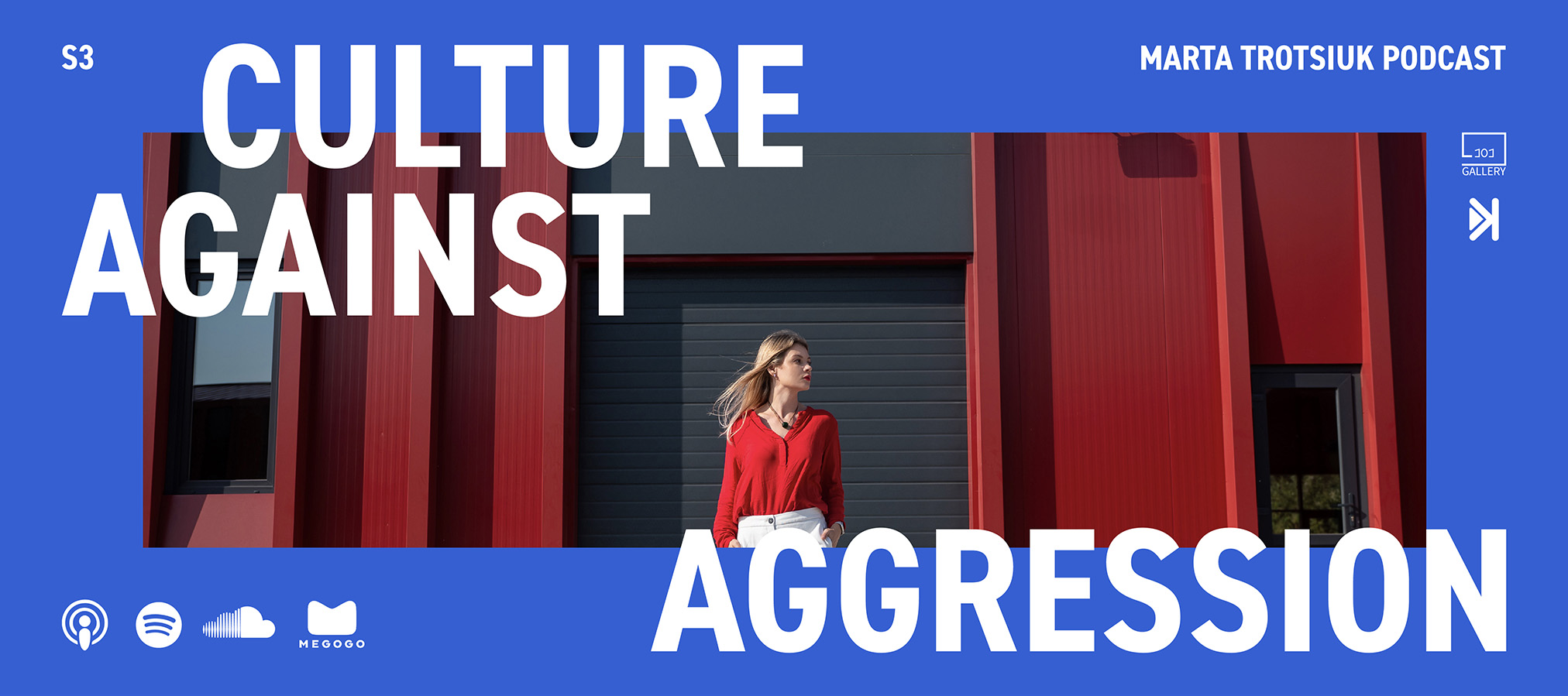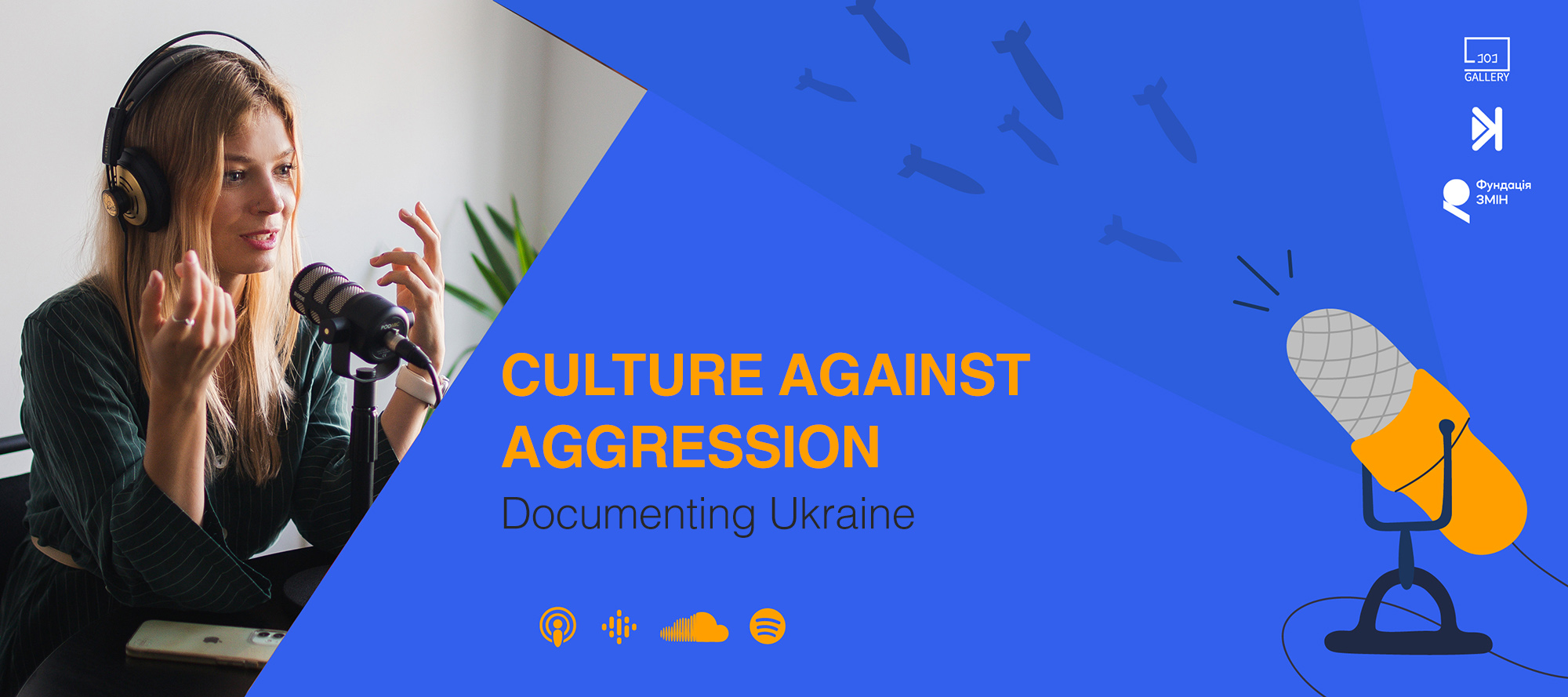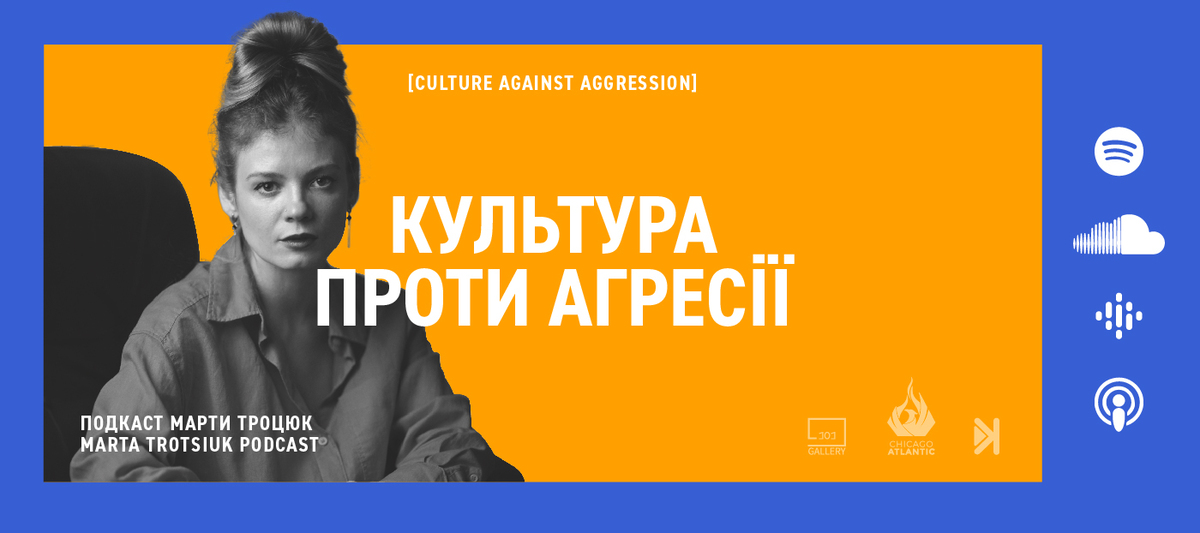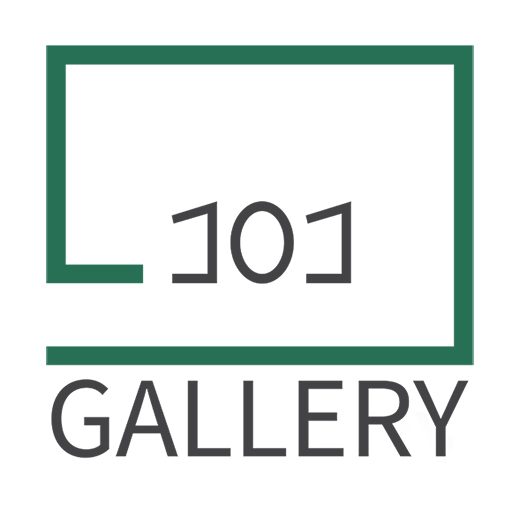
Podcast “Culture Against Aggression”
Documenting Ukrainian Culture During Wartime
The first season of the podcast is available only in Ukrainian language. The second season has English subtitles. To access the content, check out the YouTube videos provided beneath the description of each episode.
‘Culture Against Aggression’ is a research-oriented documentary, and social project aimed at creating the most comprehensive picture of cultural resistance and the functioning of Ukrainian culture during a full-scale war, for the purpose of analysis, improvement, and unification of efforts.
⫸ This project is a continuation of the initiative ‘Culture Against Aggression,’ which started as a Telegram Group created by Marta Trotsiuk on the 5th day of the full-scale war. This group includes more than 1500 representatives from the fields of culture and creative industries, serving as a platform for discussions and joint actions on topics of cultural diplomacy and countering Russian cultural influence worldwide.
⫸ In the podcast, Marta engages with guests – the most active representatives from various cultural spheres – discussing how Ukrainian culture reacts, fights, and operates during wartime.
‘Culture Against Aggression’ is a project of Gallery 101 in partnership with Radio Skovoroda, supported by ZMIN Foundation and our exclusive sponsor of the second season Chicago Atlantic Trident. The 3rd season is brought to life with the support of Dmitriy Lampert, whose belief in the importance of culture, especially in times of war, has been invaluable.
SEASON 1: First Reaction

Episode #1: ‘The First Reaction of Culture to a Full-Scale War’ featuring Pavlo Gudimov and Olesya Domaradzka
IN THE PODCAST:
“In the first episode, Olesya Domaradzka, owner of the ‘Green Sofa’ gallery, and Pavlo Gudimov, curator and founder of the art center ‘YA Gallery,’ discuss the power and mission of art.
- Were representatives of the culture prepared for the war?
- What was their initial reaction?
- How did they transform their work?
- What did they do to be heard in the international community?
- What changes await art in the near future, as well as after the war?
Episode #2: Reactive Crisis Management in Culture: Lviv’s Center for Urban History
IN THE PODCAST:
For almost half a year of the full-scale war, the office of Lviv’s Center for Urban History served as a shelter for internally displaced people, and the library became the office of the Ukrainian Institute. Despite their humanitarian mission, the representatives of the institution also fulfilled a communication role: they connected with colleagues in the cultural sphere and maintained relationships with foreign partners.
Marta Trotsiuk asked how Lviv’s Center for Urban History managed to implement reactive crisis management in practice and how their initiatives became a form of cultural resistance.
Our guests – Deputy Director Maryana Mazurak and sociologist and researcher Natalia Otrishchenko – shared their stories about the first days and months of the major war, the work of the Center and its team, changes in their activities, and about documentation as an opportunity to write history in the moment.
- What did the Center’s team do after February 24?
- What was crucial in the initial months of the war?
- When did they start documenting the memories of Ukrainians?
- How long will they continue?
- How did the institution communicate with colleagues in Ukraine?
- And with international partners and organizations?
Episode #3: ‘Volunteering in Culture During Wartime: Lesya’s Theater, Lviv Municipal Art Center‘
IN THE PODCAST:
February 24 shifted the focus of some cultural figures from artistic endeavors to volunteering.
For instance, the stage of Lesya’s Theater in Lviv transformed into a storage facility for humanitarian aid, and the inner courtyard turned into a bus parking area. Employees of the Lviv Municipal Art Center escorted EDPs from the train station during the curfew hour to ensure that tired and frightened people found themselves in comfortable conditions more quickly.
In the third episode of the podcast ‘Culture Against Aggression,’ we discuss the origins of volunteering in cultural institutions and its format over the course of 16 months of the major war. Our guests are Olha Puzhakovska, the director of Lesya’s Theatre in Lviv, and Pavlo Kovach, the curator of the Lviv Municipal Art Center and co-founder of Detenpula Gallery.
The author and host of the podcast, Marta Trotsiuk, inquired about the initial reaction of cultural institutions, the choice to stay in their place, and when they managed (at least partially) to return to their usual activities. Why did the Lesya’s Theatre open its doors to the audience last? How did the Lviv Municipal Cultural Center respond to the full-scale invasion? What changed in the operations of both institutions?”
Episode #4: Museums in the crosshairs: Territory of Terror and Shevchenko Grove
IN THE PODCAST:
If a village dies and along with it a museum, then consider that village never existed.
Museums hold information about who we are, where we come from, where we’re going, and why. And we must preserve the museums that are currently in the crosshairs. In the fourth episode of the podcast ‘Culture Against Aggression,’ we discuss the protection of cultural heritage during the over 500 days of the major war.
The author and host, Marta Trotsiuk, invited the directors of two of the most well-known museums in Lviv – the Territory of Terror Museum and Shevchenko Grove. Olha Honchar is the director of the Territory of Terror Museum and also the founder and coordinator of the Museum Crisis Center. And Mykhailo Zakopets is the director of the Museum of Folk Architecture and Rural Life in Lviv named after Klymentiy Sheptytskyi (Shevchenko Grove).
The recording location is also special – in a cultural setting that knows how to stand up for its own and preserve the most valuable by passing it down through generations – the old Lviv synagogue.
- How did the museums react at the beginning of the full-scale invasion?
- What was the state’s reaction?
- How did foreign colleagues and partners help?
- Were any artifacts taken out of Ukraine for preservation?
- How are they working on the conservation and security of our cultural heritage?
- And how are they taking care of themselves?
Cultural heritage is so valuable because it confirms our existence as a nation. Listen and become carriers of the latest Ukrainian culture.
Episode #5: ‘Choosing Between the Cultural Rear and Service in the Armed Forces: Oleh Yaskiv’
IN THE PODCAST:
Oleh Yaskiv, a scientist, public and political figure, vice-rector of UCU, and director of the Sheptytsky Center, states that the war was only a matter of time after Ukraine gained independence: ‘Knowing Russian culture, history, and psychology, I felt that it wouldn’t be that easy for us to separate.’
In the fifth episode of the podcast ‘Culture Against Aggression,’ the author and host, Marta Trotsiuk, talked with Oleh about the most challenging aspect: the choice between the cultural front and military service.
Our guest is now a captain in the Ukrainian Armed Forces and joined the defense effort even before February 24, while also continuing to lead a cultural institution.
- How did he make this decision, and how did he prepare for the war?
- How was the preparation conducted at the Sheptytsky Center and UCU?
- Is it necessary, and who should fund culture during wartime?
We met with Oleh Yaskiv at the Sheptytsky Center, where he was released by the command to allow us to record the interview.
Episode #6: ‘Reactive Art in Wartime: Vlodko Kaufman’
IN THE PODCAST:
Watch the video
Please turn on English subtitles.
SEASON 2: Cultural Diplomacy

Episode #7: ‘Promoting Ukrainian culture within the country and the Ukrainian context abroad: Bogdan Logvynenko, Ukraїner’
IN THE PODCAST:
In this episode, together with Bogdan Logvynenko, we delve into the topic of how Ukraine communicates its culture both inside and outside the country.
- How does cultural diplomacy shape Ukraine’s image in the world?
- How does external cultural communication help us understand ourselves better?
- The connection between mass media and cultural narratives.
- Can media be voluntary?
- About social resistance.
You can also listen to our podcast on the most popular podcast platforms. Please, subscribe and share with those who want to know more about Ukraine.
Apple podcasts
Google podcasts
Spotify
SoundCloud
“Culture Against Aggression” is the project of Gallery 101 in partnership with Radio SKOVORODA and with the support of our exclusive sponsor Chicago Atlantic Trident.
Host and author Marta Trotsiuk
Guest Bogdan Logvynenko
Location — the cozy office of Ukraїner
Watch the video
Episode #8: ‘The Ukrainian Film Industry During Wartime. Podcast with Yulia Sinkevych’
IN THE PODCAST:
In the second episode of the second season of “Culture Against Aggression”, we document Ukrainian cultural diplomacy through cinema and reflect on the right perspective for showcasing Ukrainian cinema to the world.
Our guest is Julia Sinkevych. A producer, former head of the Odesa International Film Festival, chair of the supervisory board of the Ukrainian Institute, co-founder of the Ukrainian Film Academy, a member of the European Film Academy, and the Women In Arts award laureate.
In this episode:
- How to effectively communicate on international platforms during wartime?
- Why did the Ukrainian team decide to stay in Cannes despite Russian participation in the festival?
- When will Ukrainian films start being made at Hollywood standards, and is it necessary?
- How to generate interest among Ukrainians in domestic cinema?
- What Ukrainian films to recommend to foreigners?
- The prospects of the Ukrainian film industry during the full-scale invasion and after
“Culture Against Aggression” is the project of Gallery 101 in partnership with Radio SKOVORODA and with the support of our exclusive sponsor Chicago Atlantic whose impact investment strategy Trident is building homes for Ukrainians and expanding the country’s industrial capacity, laying the foundation we need to revitalize Ukrainian culture and commerce.
- Host and author Marta Trotsiuk
- Guest Julia Sinkevych
- Location Dovzhenko Center
Watch the video
IN THE PODCAST:
In this episode of Culture Against Aggression podcast we discuss how collaboration between Ukraine and other countries is being built through non-governmental initiatives, what connects foreigners to our cultural processes, and what motivates them to engage and support our culture.
Guests of the podcast:
- Bozhena Pelenska – Program and executive director of Jam Factory Art Center, newly opened (November 2023) in Lviv
- Dmytro Lampert – partner & chief operating officer of Chicago Atlantic Trident, impact investing strategy focused on Ukraine
- Volodymyr Byehlov – America House Lviv director, cultural manager and journalist
Content:
- The story of a foreigner founding two key cultural institutions in Ukraine
- The story of the power of social media and how a project emerged from communication on LinkedIn. A collaboration between Ukraine and the USA.
- About networking. How America House Lviv became the most beautiful shelter in Lviv, and actively worked in culture right from the beginning of the full-scale war.
- Why an American investment company decided to support a cultural project in Ukraine.
- How is it to open an art center during a war. The story, processes, and brave decisions.
- When the impossible becomes possible. The work of an American cultural institution in Ukraine during the war and the “Galician” approach to matters.
- Cultural tools that can help attract American attention to Ukraine.
- How to build cultural connections during a war and whether it’s easier if the founder is a foreigner.
- Summary. An important message for the foreign audience.
You can also listen to our podcast on the most popular podcast platforms. Please, subscribe and share with those who want to know more about Ukraine.
Apple podcasts
Google podcasts
Spotify
SoundCloud
“Culture Against Aggression” is the project of Gallery 101 in partnership with Radio SKOVORODA and with the support of our exclusive sponsor Chicago Atlantic whose impact investment strategy Trident is building homes for Ukrainians and expanding the country’s industrial capacity, laying the foundation we need to revitalize Ukrainian culture and commerce.
• Host and author Marta Trotsiuk (on LinkedIn)
Watch the video
Episode #10: “Export of Ukrainian culture. Conversation with Katya Taylor“
IN THE PODCAST:
Katya Taylor, an art curator and expert in contemporary art, was the guest on our fourth episode of the “Culture Against Aggression” podcast. On the other hand, we also became guests, as Katya hosted the Gallery 101 team and the Skovoroda team at her home in Kyiv.
During the podcast, we discussed the export of Ukrainian culture abroad: how to present ourselves in a way that is both understandable and interesting. Katya mentioned that we have different paces: Ukrainians do everything in about 5 minutes, while foreigners are not accustomed to such speed. Additionally, the key to understanding lies in consensus – sometimes we need to compromise, and sometimes others need to meet us halfway.
“Misunderstandings on the international level don’t arise because we ask for something abnormal or something they can’t give us. The European cultural community is ready to accept Ukrainians, but they want us to act according to their established rules.” Katya also shared her vision regarding the function of Ukrainian culture, the mission of cultural diplomacy, and the theme of war in further communication with the world.
Content:
- Events at Port of Culture during the full-scale invasion and the first initiatives of cultural diplomacy
- A hut in the middle of a field and the USAID project that helped to avoid psychological disorders
- Countries where conducting cultural projects was easiest
- Main problems in the process of communication with foreign partners
- About differences in process speeds and misunderstandings between foreigners and Ukrainians
- Refusals to showcase Ukrainian artistic projects
- Is it easy to communicate and work with foreign institutions/organizations?
- The dilemma in choosing project themes: war representation or avoiding directness
- Solutions that help make projects understandable for foreign audiences
- Experience creating a Ukrainian art project in Kenya
- What to focus on: countries where Ukrainians are not welcomed but there is a need for Ukrainian art projects or loyal and open nations
- Advice for a hypothetical foreign colleague in a war situation
- Best practices in communication with potential foreign partners
- Personal experiences of war
You can also listen to our podcast on the most popular podcast platforms. Please, subscribe and share with those who want to know more about Ukraine.
Apple Podcasts
Google podcasts
Spotify
SoundCloud
“Culture Against Aggression” is the project of Gallery 101 in partnership with Radio SKOVORODA and with the support of our exclusive sponsor Chicago Atlantic whose impact investment strategy Trident is building homes for Ukrainians and expanding the country’s industrial capacity, laying the foundation we need to revitalize Ukrainian culture and commerce.
• Host and author Marta Trotsiuk (on LinkedIn)
Watch the video
IN THE PODCAST:
We talk a lot about the power of horizontal cultural connections, but what about state cultural diplomacy?
In the fifth episode of the “Culture Against Aggression” podcast, we discuss with Volodymyr Sheiko the Director General of the Ukrainian Institute, about state work in the field of culture abroad, new Ukrainian cultural narratives, and directions we need to focus on.
How does the demand for Ukrainian cultural products correlate with success on the front lines? What cultural messages are foreigners willing to accept, and which ones have they grown tired of? Where does Ukraine currently stand on the global cultural map? Why is radicalism and straightforwardness a losing option?
Content:
- What the Ukrainian Institute is engaged in
- How the institution’s activities have changed after the full-scale invasion
- Is there a focus on culture? The state’s position on culture during wartime
- Cultural diplomacy policies
- Why culture is not included in Ukraine’s recovery plan
- Where is currently Ukraine on the world’s cultural map
- Interesting findings from research on russian cultural propaganda
- How russia monitors Ukrainian cultural diplomacy
- Adaptability in communication: what works and what is no longer relevant in cultural diplomacy
- How the Ukrainian Institute prioritizes countries for cultural diplomacy
- How the demand for Ukrainian cultural products correlates with success on the front line
- How much time is needed to build sustainable connections with foreign institutions
- What needs to be done to be recommended by the Ukrainian Institute
- Advice for a hypothetical colleague from another country facing a similar wartime situation
- Personal experiences of war You can also listen to our podcast on the most popular podcast platforms.
You can also listen to our podcast on the most popular podcast platforms. Please, subscribe and share with those who want to know more about Ukraine.
Apple podcasts
Google podcasts
Spotify
SoundCloud
“Culture Against Aggression” is the project of Gallery 101 in partnership with Radio SKOVORODA and with the support of our exclusive sponsor Chicago Atlantic whose impact investment strategy Trident is building homes for Ukrainians and expanding the country’s industrial capacity, laying the foundation we need to revitalize Ukrainian culture and commerce.
• Host and author Marta Trotsiuk (on LinkedIn)
Watch the video
SEASON 3: Cultural Resistance

Episode #12: “Ukrainian Literature and Publishing During the War”
IN THE PODCAST:
This episode is about Ukrainian literature and publishing during the war. It explores whether there are enough Ukrainian books on international shelves and what to do when Russian literature is placed alongside them. It also covers internal decolonization processes and the international discourse.
Guest: Sofiya Chelyak, cultural manager and program director of Lviv BookForum. Topics include canceling Russian imperial literature abroad and in Ukraine, education and libraries, and promoting Ukrainian publishing at international fairs.
Available on:
Apple Podcasts
Spotify
SoundCloud
“Culture Against Aggression” is a “Gallery 101” project in partnership with Radio SKOVORODA. This season is brought to life with the support of Dmitriy Lampert, whose belief in the importance of culture, especially in times of war, has been invaluable.
Host: Marta Trotsiuk
Guest: Sofia Cheliak
Episode #13: “Viktor Ruban: dance, ballet, and the cancelation of russian propaganda”
IN THE PODCAST:
Why does russian cultural propaganda still influence the global art context? And how do Ukrainian artists debunk the myths of cultural “neutrality”? In the second episode of the third season of “Culture Against Aggression” podcast, author and host Marta Trotsiuk, together with philosopher, cultural theorist, choreographer, and dancer Viktor Ruban, discuss art as a means of countering informational warfare.
In this episode, you will learn:
- How cultural diplomacy and cultural resistance actually work
- Why culture cannot be apolitical
- How performative art becomes a tool to counter russian cultural propaganda
- Why it is important to separate Ukrainian ballet from the russian cultural narrative and dismantle colonial myths
Available on:
Apple Podcasts
Spotify
SoundCloud
“Culture Against Aggression” is a “Gallery 101” project in partnership with Radio SKOVORODA. This season is brought to life with the support of Dmitriy Lampert, whose belief in the importance of culture, especially in times of war, has been invaluable.
Host: Marta Trotsiuk
Guest: Viktor Ruban
Episode #14: “Museums During Wartime: Decolonization and Cultural Resistance”
IN THE PODCAST:
How do museums become centers for shaping historical memory? Discover how culture transforms into a tool for diplomacy in the third episode of the third season of the podcast “Culture Against Aggression”!
In the podcast, Marta Trotsiuk talks with Yuriy Savchuk—a PhD in History, researcher, and curator of over 20 museum projects. Yuriy is the director of the National Museum of the History of Ukraine in the Second World War (warmuseum_ua).
- Why did the exhibition “Ukraine – Crucifixion” receive the “museum Oscar” in London?
- What does the removal of the Soviet emblem from the Motherland Monument signify?
- What does it take to organize an exhibition abroad during wartime?
- How does the museum team innovate and create a new national narrative?
- Which countries support Ukrainian cultural diplomacy, and why is this important?
- What projects from Ukrainian museums are surprising the world?
- Listen also:
Apple Podcasts
Spotify
SoundCloud
MEGOGO Audio
“Culture Against Aggression” is a “Gallery 101” project in partnership with Radio SKOVORODA. This season is brought to life with the support of Dmitriy Lampert, whose belief in the importance of culture, especially in times of war, has been invaluable.
Host: Marta Trotsiuk
National Museum of the History of Ukraine in the Second World War warmuseum.kyiv.ua
Episode #15: “Ukrainian Photography: Volunteering and Cultural Diplomacy”
IN THE PODCAST:
- Can art be a weapon? How do Ukrainian photographers prove their stance to the world? And why is it important to talk not only about the war but also about the talented society enduring it?
Serhii Melnichenko – photographer, dancer, founder of the conceptual photography platform MYPH, the first Ukrainian winner of the Leica Oskar Barnack Award, and the guest of the fourth episode of the podcast “Culture Against Aggression.” He shares his journey: from his first NFT sales in February 2022 to major exhibitions abroad. How difficult is it to compete with Russian propaganda? How do we deal with the narrative of “good Russians” in culture? And what needs to be done for the world to see us as we truly are?
This podcast is about the power of photography, the challenges, and the answers to them.
Become part of the cultural resistance and share your thoughts in the comments! Support the project “Culture Against Aggression” by reposting or sharing the episode with your friends.
Listen on:
“Culture Against Aggression” is a “Gallery 101” project in partnership with Radio SKOVORODA. This season is brought to life with the support of Dmitriy Lampert, whose belief in the importance of culture, especially in times of war, has been invaluable.
Host: Marta Trotsiuk
Guest: Serhii Melnichenko, The school of conceptual and art photography MYPH
Episode #16: “Music in Times of War: Mission, Challenges, Resistance”
IN THE PODCAST:
Can music change the world and support a nation in its toughest times?
In the fifth episode of the third season of the podcast “Culture Against Aggression,” we continue documenting Ukrainian culture during wartime. Marta Trotsiuk welcomes a special guest — Marko Halanevych, musician, actor, and member of the iconic band DakhaBrakha. Together, they explore the power of music as a tool for cultural diplomacy and resistance.
Marko shares his emotions from the early days of the full-scale invasion, explains how the band turned their concerts into platforms for delivering critical messages to the world, and discusses why their mission goes beyond music—it’s also a fight to draw attention to Ukraine.
What is cultural diplomacy in wartime? How do musicians transform emotions into a weapon? And why can even one song inspire someone to return home?
Listen on:
Apple Podcasts
Spotify
SoundCloud
MEGOGO Audio
“Culture Against Aggression” is a “Gallery 101” project in partnership with Radio SKOVORODA. This season is brought to life with the support of Dmitriy Lampert, whose belief in the importance of culture, especially in times of war, has been invaluable.
Host: Marta Trotsiuk




